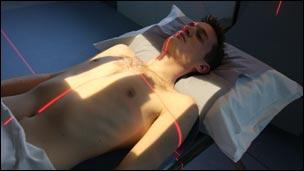UK radiotherapy 'lagging behind'
- Published

Radiotherapy 'needs more public attention'
Too few UK cancer patients are receiving state-of-the-art radiotherapy care, experts say.
Cancer Research UK (CRUK) warns only 7% of patients receive a new type of radiotherapy, compared with 20% in Europe.
Writing in the BBC's Scrubbing Up column, CRUK experts said patients were receiving older types of radiotherapy - or having to travel abroad for care.
The UK's cancer tsar said plans were being developed to improve care.
The number of people receiving radiotherapy in the UK tripled between 2000 and 2009, and the number of radiographers (the health service staff who delivers radiotherapy) rose by 40% between 2000 and 2006.
But CRUK estimates that, in total, only 38% of cancer patients in England are getting radiotherapy - although research shows that up to 50% might benefit.
The charity says differences in staffing levels and equipment means UK health care trusts are failing to offer equal opportunities for patients to receive radiotherapy.
And for those patients who are being offered radiotherapy, many suffer unacceptably long waiting times before receiving their treatment, the charity says.
'Cutting edge'
It believes a lack of public awareness about radiotherapy's importance in treating cancer is affecting treatment provision.
A survey of 2,000 people for the charity found only one in 10 knew radiotherapy helps cure 40% of cancer patients.
The survey showed the public is more likely to rate other treatments - surgery, chemotherapy or targeted drugs - as "cutting edge" treatments.
Experts say the UK is lagging behind the US and Europe in introducing new, more targeted radiotherapy technology, such as intensity modulated radiotherapy (IMRT) or image guided radiotherapy (IGRT).
IMRT uses computers to control the radiotherapy machine to vary the intensity of the radiation beams, helping to closely match the three dimensional shape of the tumour.
It gives very precise doses to a cancer or to specific areas within the tumour while minimising the dose to nearby tissues.
IGRT takes images of the cancer before and during radiotherapy so the doctor can make sure the treatment is precise and accurate.
Steering priorities
Professor Gillies McKenna, director of the Gray Institute for Radiation Oncology and Biology at the University of Oxford, said: "Radiotherapy is a critical part of cancer treatment.
"We know that around 20% of cancer patients receive IMRT in Europe, while the UK is only delivering it to 7% of patients.
"This newer type of radiotherapy is more effective in delivering targeted treatment, minimising side-effects to other parts of the body."
Harpal Kumar, chief executive of CRUK said: "Radiotherapy has improved substantially over the last 10 years, but there are vital areas that need to be addressed to help deliver the best treatment for patients.
"Radiotherapy needs the same level of public support that new drugs have. We have seen awareness helping steer priorities with other treatments and believe this should happen with radiotherapy."
He said: "It's important that all areas of the UK offer the same opportunities for patients to have radiotherapy wherever they live."
Professor Sir Mike Richards, the government's national cancer tsar, said: "Delivering state of the art radiotherapy is a complex operation.
"We are now planning ways to boost services to meet the needs of future cancer patients so we can offer radiotherapy to all those who would benefit from it."